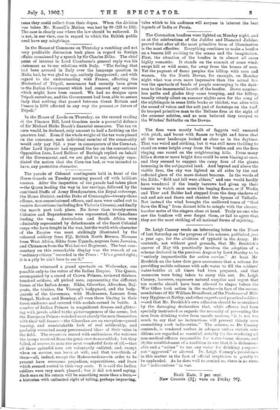Dr. Leigh Canney sends an interesting letter to the Times
of last Saturday on the progress of his scheme, published just a year ago, for the abolition of typhoid in the Army. He contends, not without good grounds, that Mr. Brodrick's answer of May 6th practically involves the adoption of a scheme declared in the previous August by Lord Stanley to be "entirely impracticable for active service." At least Mr Brodrick on the later date gave assurances that a scheme for providing mobile columns with safe water to fill the soldiers' water-bottles at all times had been prepared, and that measures were being taken to carry this out. Dr. Leigh Canney, however, expresses natural surprise and regret that ten months should have been allowed to elapse before the War Office took action in the matter—in face of the recom- mendations of Sir William Broadbent, of the Professor of Mili- tary Hygiene at Netley, and other experts and practical soldiers —and that Mr. Brothick's own adhesion should be neutralised by the damaging declaration that, while officers bad been specially instructed as regards the necessity of preventing the men from drinking water from unsafe sources, "it is not too much to say that no instructions will prevent thirsty men committing such indiscretion." The scheme, as Dr. (Janney contends, is rendered useless in advance unless certain con- ditions are regarded as essential, notably (a) the rendering ail non-medical officers responsible for water-borne disease, and (b) the establishment of a tradition in war that it is dishonour- able and a " crime " to use any water for drinking purposes not " approved " or allowed. Dr. Leigh Canney's persistence in this matter in the face of official scepticism is greatly to be applauded. As he does well to remind us, there is no room for " indiscretions " in war.














































 Previous page
Previous page